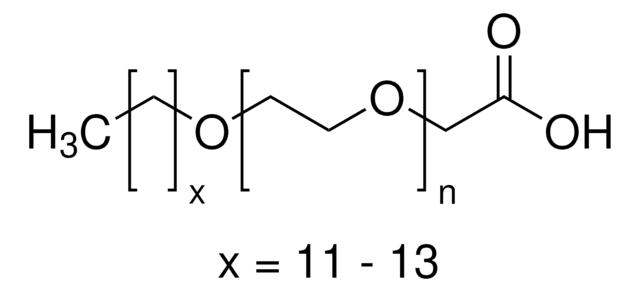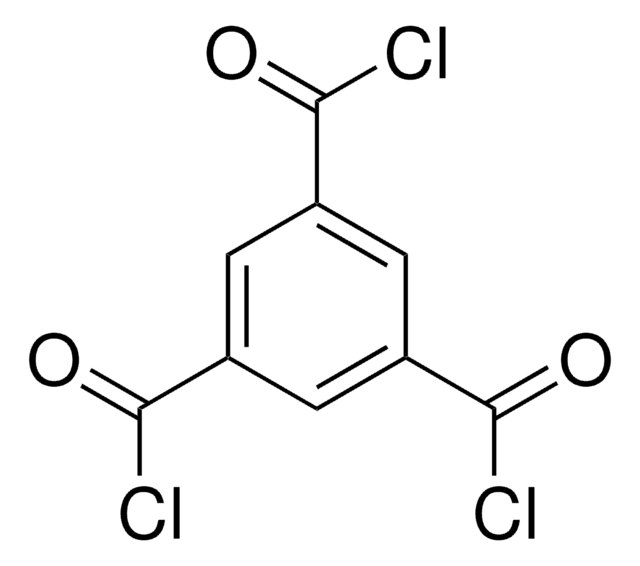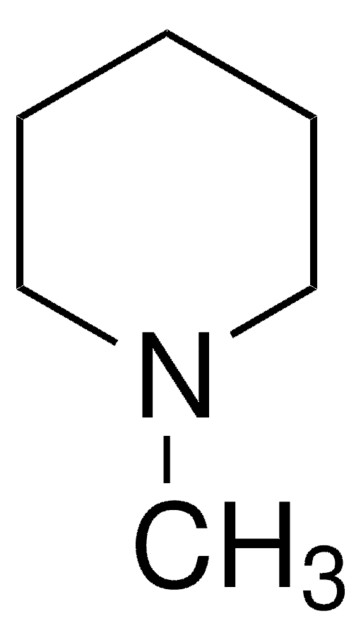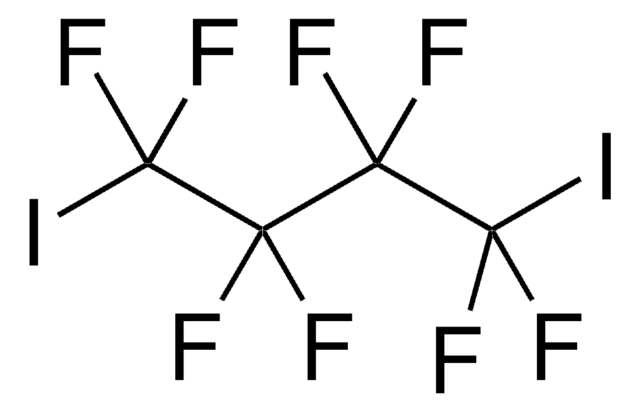473197
Poly(ethylene glycol) 4-nonylphenyl 3-sulfopropyl ether potassium salt
Synonyme(s) :
Polyethylene glycol
Se connecterpour consulter vos tarifs contractuels et ceux de votre entreprise/organisme
About This Item
Produits recommandés
Forme
viscous liquid
Niveau de qualité
Indice de réfraction
n20/D 1.473
pb
81 °C (lit.)
Densité
1 g/mL at 25 °C (lit.)
Vous recherchez des produits similaires ? Visite Guide de comparaison des produits
Catégories apparentées
Description générale
Poly(ethylene glycol) 4-nonylphenyl 3-sulfopropyl ether potassium salt is an anionic PEG derivative that can be used as a soft polyoxyethylene sulfonate anion.
Application
Poly(ethylene glycol) 4-nonylphenyl 3-sulfopropyl ether potassium salt can be used as an anionic surfactant in the fabrication of hierarchical β-Ni(OH)2 microspheres and nickel oxide hollow spheres for supercapacitor applications.
Poly(ethylene glycol) 4-nonylphenyl 3-sulfopropyl ether potassium salt was also demonstrated to be effective for protecting thermostable DNA polymerase during amplification reactions conducted at a temperature ranging from about 40° C to greater than 100° C.
DNA polymerases, such as Taq, do become inactive over time at the high temperatures utilized in thermal cycling reactions such as polymerase chain reaction (PCR). It has been discovered that thermostable DNA polymerases could be protected from such heat inactivation by contacting the polymerase with poly(ethylene glycol) 4-nonylphenyl 3-sulfopropyl ether potassium salt during a thermal cycling process, and improve the specificity of amplification.
Poly(ethylene glycol) 4-nonylphenyl 3-sulfopropyl ether potassium salt was also demonstrated to be effective for protecting thermostable DNA polymerase during amplification reactions conducted at a temperature ranging from about 40° C to greater than 100° C.
DNA polymerases, such as Taq, do become inactive over time at the high temperatures utilized in thermal cycling reactions such as polymerase chain reaction (PCR). It has been discovered that thermostable DNA polymerases could be protected from such heat inactivation by contacting the polymerase with poly(ethylene glycol) 4-nonylphenyl 3-sulfopropyl ether potassium salt during a thermal cycling process, and improve the specificity of amplification.
Forme physique
~20 EO/mole
Informations légales
The composition of this product in combination with thermostable DNA polymerase (including, but not limited to, Taq polymerase) is covered by US Patent No. 7,972,828 and related foreign equivalents. In addition, use of this product may be covered by US Patent No. 8,404,464 and related foreign equivalents.
Code de la classe de stockage
10 - Combustible liquids
Classe de danger pour l'eau (WGK)
WGK 3
Point d'éclair (°F)
No data available
Point d'éclair (°C)
No data available
Équipement de protection individuelle
Eyeshields, Gloves
Faites votre choix parmi les versions les plus récentes :
Déjà en possession de ce produit ?
Retrouvez la documentation relative aux produits que vous avez récemment achetés dans la Bibliothèque de documents.
Fabrication of novel hierarchical beta-Ni (OH) 2 and NiO microspheres via an easy hydrothermal process
Kuang D, et al.
The Journal of Physical Chemistry C, 113(14), 5508-5513 (2009)
Reactive CeO2 nanofluids for UV protective films
Maniglia R, et al.
Journal of Colloid and Interface Science, 506(4), 346-354 (2017)
Solvent-free protein liquids and liquid crystals.
Adam W Perriman et al.
Angewandte Chemie (International ed. in English), 48(34), 6242-6246 (2009-07-16)
Rational synthesis of hierarchically porous NiO hollow spheres and their supercapacitor application
Yan X, et al.
Materials Letters, 95(14), 1-4 (2013)
Functionalized ZnO nanoparticles with liquidlike behavior and their photoluminescence properties
Bourlinos AB, et al.
Small, 2(4), 513-516 (2006)
Notre équipe de scientifiques dispose d'une expérience dans tous les secteurs de la recherche, notamment en sciences de la vie, science des matériaux, synthèse chimique, chromatographie, analyse et dans de nombreux autres domaines..
Contacter notre Service technique![(1S,4S)-(−)-2-Boc-2,5-diazabicyclo[2.2.1]heptane 95%](/deepweb/assets/sigmaaldrich/product/structures/401/063/1eb3be94-6385-4815-8b42-ff76c097cc27/640/1eb3be94-6385-4815-8b42-ff76c097cc27.png)








